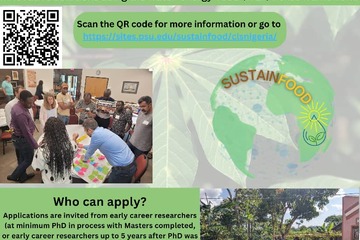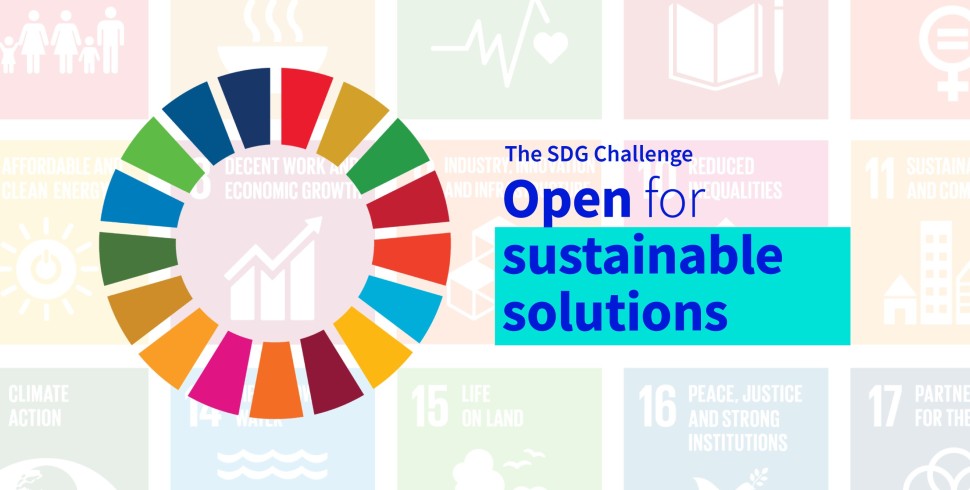Browse
Agri Food Systems
Grant Assistance for Grassroots Human Security Projects in Uganda
Deadline: Feb 15, 2025
Donor: Embassy of Japan in Uganda
Grant Type: Grant
Grant Size: $10,000 to $100,000
Countries/Regions: Uganda
Area: Financial Assistance, Agriculture Food & Nutrition, Children, Community Development, Disability, Education, Primary Education, Secondary Education, Vocational Education, Health care, Reproductive Health & Family Planning, Disaster Preparedness, Water & Sanitation, Women & Gender
The Embassy of Japan in Uganda is pleased to announce the Grant Assistance for Grassroots Human Security Projects to provide financial assistance to non-profit, development-oriented organizations to support community development projects which directly benefit people at the grassroots level.
For more information, visit https://www.ug.emb-japan.go.jp/itpr_en/ggp_en.html#header
Premium Link: https://grants.fundsforngospremium.com/opportunity/op/grant-assistance-for-grassroots-human-security-projects-in-uganda
By:
Baboki Gaolaolwe-Major
Thursday, Dec 12, 2024
AGRI-FOOD SYSTEMS
+3
No Preview Available
Leave a comment
Join the 2025 SustainFood Collaborative Learning School!
Are you passionate about the Water-Energy-Food (WEF) Nexus and looking to make a lasting impact? The SustainFood CLS will take place May 5–16, 2025, in Ona Ara, Ibadan, Nigeria, bringing together early-career researchers, farmers, policymakers, and stakeholders to tackle pressing environmental challenges. 🌾💧⚡
🎓 Who can apply?
PhD candidates (Master’s completed) or early-career researchers (up to 5 years post-PhD)
Researchers from the US, Africa, or EU NexusNet countries with WEF Nexus-related work
💼 What to expect:
Virtual preparatory sessions before the in-person program
Collaborative learning to drive sustainable solutions
Networking opportunities beyond the CLS
📅 Deadline: January 12, 2025📧 Secure your advisor's reference letter and apply today!
For more info or to apply, contact Nathan Weyandt at ndw5072@psu.edu. Let’s shape sustainable food systems together! Link: https://sustainfood.psu.edu/clsnigeria/
By:
Baboki Gaolaolwe-Major
Tuesday, Nov 26, 2024
AGRI-FOOD SYSTEMS
+2

Leave a comment
CFAs: Evidence-Informed Policy Making Grants Program
Deadline: Feb 19, 2025
Donor: The British Academy
Grant Type: Grant
Grant Size: $100,000 to $500,000
Countries/Regions: Afghanistan, Angola, Bangladesh, Benin, Brazil, Burkina Faso, Burundi, Cambodia, Central African Republic, Chad, Comoros, Congo DR, Djibouti, Egypt, Eritrea, Ethiopia, Gambia, Guinea, Guinea-Bissau, Haiti, Indonesia, Jordan, Kenya, Kiribati, Laos, Lesotho, Liberia, Madagascar, Malawi, Malaysia, Mali, Mauritania, Mozambique, Burma(Myanmar), Nepal, Niger, Philippines, Rwanda, Sao Tome And Principe, Senegal, Sierra Leone, Solomon Islands, Somalia, South Africa, Sudan, Tanzania, Thailand, East Timor (Timor-Leste), Togo, Turkey, Tuvalu, Uganda, United Kingdom, Viet Nam, Yemen, Zambia, South Sudan
Area: Agriculture Food & Nutrition, Urban Development, Biodiversity, Climate Change, Conservation, Environment, Health, Technology, Water
The British Academy is inviting proposals related to evidence-informed policy-making in Brazil, Egypt, Indonesia, Jordan, Kenya, Malaysia, Philippines, South Africa, Turkey, Thailand, Vietnam and/or Least Developed Countries.
For more information, visit https://www.thebritishacademy.ac.uk/funding/evidence-informed-policymaking-grants/
Premium Link: https://grants.fundsforngospremium.com/opportunity/op/cfas-evidenceinformed-policy-making-grants-program
By:
Baboki Gaolaolwe-Major
Sunday, Nov 24, 2024
AGRI-FOOD SYSTEMS
+2
No Preview Available
Leave a comment
Call for Proposals: GEF Small Grants Programme in Malawi
Deadline: Dec 06, 2024
Donor: United Nations Development Programme (UNDP)
Grant Type: Grant
Grant Size: $10,000 to $100,000
Countries/Regions: Malawi
Area: Agriculture Food & Nutrition, Fishing, Endangered Species, Capacity Building, Biodiversity, Climate Change, Energy, Environment, Innovation, Livelihood
The United Nations Development Programme (UNDP) is seeking proposals for the GEF Small Grants Programme to support small-scale projects for activities that conserve and restore the environment while enhancing people’s wellbeing and livelihoods, taking into consideration of gender, vulnerability, and equality concerns.
For more information, visit https://www.undp.org/malawi/publications/call-project-proposals-gef-small-grants-programme
Premium Link: https://grants.fundsforngospremium.com/opportunity/op/call-for-proposals-gef-small-grants-programme-in-malawi
By:
Baboki Gaolaolwe-Major
Sunday, Nov 24, 2024
AGRI-FOOD SYSTEMS
+2
No Preview Available
Leave a comment
Nominations open for Leading African Women in Food Fellowship Program
Deadline: Jan 18, 2025
Donor: African Food Changemakers
Grant Type: Fellowship
Grant Size: Not Available
Countries/Regions: Algeria, Angola, Benin, Botswana, Burkina Faso, Burundi, Cameroon, Cape Verde, Central African Republic, Chad, Comoros, Congo (Brazzaville), Congo DR, Cote DIvoire (Ivory Coast), Djibouti, Egypt, Equatorial Guinea, Eritrea, Ethiopia, Gabon, Gambia, Ghana, Guinea, Guinea-Bissau, Kenya, Lesotho, Liberia, Libya, Madagascar, Malawi, Mali, Mauritania, Mauritius, Mayotte, Morocco, Mozambique, Namibia, Niger, Nigeria, Reunion, Rwanda, Saint Helena, Sao Tome And Principe, Senegal, Seychelles, Sierra Leone, Somalia, South Africa, Sudan, Swaziland, Tanzania, Togo, Tunisia, Uganda, Western Sahara, Zambia, Zimbabwe, South Sudan
Area: Agriculture Food & Nutrition, Business & Industry, Poverty Alleviation, Sustainable Development, Gender Equality, Women & Gender
Do you know any woman leading in the Food Ecosystem? If so, they would love to meet them. African Food Changemakers is currently accepting nominations for the Leading African Women in Food Fellowship, an ambitious program aimed at amplifying the voices and work of young African women who are making outstanding contributions and impact across the food ecosystem.
For more information, visit https://lawff.afchub.org/
Premium Link: https://grants.fundsforngospremium.com/opportunity/op/nominations-open-for-leading-african-women-in-food-fellowship-program
By:
Baboki Gaolaolwe-Major
Sunday, Nov 24, 2024
AGRI-FOOD SYSTEMS
+1
No Preview Available
Leave a comment
RFAs: Build Partner Capabilities to Counter Global Biological Threats
The U.S. Department of State’s Bureau of International Security and Nonproliferation, Office of Cooperative Threat Reduction is inviting applications for a new program aimed at enhancing global resilience against biological threats.
Grant Size: Over $1 millionEligible Regions: Angola, Brazil, Egypt, Ethiopia, Kenya, South Korea, Nigeria, South Africa, Turkey, and many more.Focus Areas: Agriculture, Food & Nutrition, CapacityBuilding, Cyber Security, Research, Biotech, Science, and Technology
This program supports projects that strengthen partner capacities to counter biological risks worldwide. Join this crucial mission to advance global health security!
🔗 For more information, visit:
https://grants.gov/search-results-detail/356859
Premium Link: https://grants.fundsforngospremium.com/opportunity/op/build-partner-capabilities-to-counter-global-biological-threats
By:
Baboki Gaolaolwe-Major
Wednesday, Oct 30, 2024
AGRI-FOOD SYSTEMS
+1
No Preview Available
Leave a comment
IRELAND: SFI Sustainable Development Challenge (Over €1,000,000 Grant) 2025
Grant size: 1 million Euros
Donor: The Science Foundation Ireland
The SDG Challenge seeks to support diverse, transdisciplinary teams to develop transformative, sustainable solutions that will contribute to addressing development challenges under the UN SDGs in countries where Irish Aid works.
SFI and Irish Aid are seeking solutions that contribute to SDG 2: Zero Hunger, “End hunger, achieve food security and improved nutrition and promote sustainable agriculture”.
The SDG Challenge supports highly motivated, transdisciplinary teams developing transformative, sustainable solutions for UN SDGs in Irish Aid’s partner countries. Furthermore, interested applicants should take note of the following criteria:
Teams must be transdisciplinary and focused on developing sustainable solutions for UN SDGs in Irish Aid’s partner countries.
Teams should combine technical and non-technical skills and represent collaborative partnerships between researchers in Ireland and the partner country.
Expertise in a STEM research area is necessary ,along with knowledge or experience in complementary fields like international development, economics, or behavioral science.
Two academic researchers must be in the core team, with at least one from a relevant STEM discipline.
Funding should reflect the contributions of all team members.
https://www.afterschoolafrica.com/87048/science-foundation-ireland-sfi-2024-sustainable-development-challenge-over-e1000000-grant/
By:
Tony Milanzi
Tuesday, Aug 27, 2024
AGRI-FOOD SYSTEMS
+5

No Preview Available
Leave a comment
The Mastercard Foundation Fund for Resilience and Prosperity Agribusiness Challenge Fund
Grant size: $500,000 - $2,500,000
Donor: Mastercard Foundation
The Agribusiness Challenge Fund will provide SMEs with innovative and commercially viable agribusinesses across 20 countries in Sub-Saharan Africa the opportunity to receive support to upscale their businesses in a bid to create sustainable employment opportunities for young people, with particular focus on young women.
Selected SMEs will receive support from the Fund, including grants ranging from US$ 500,000 to US$ 2,500,000, disbursed over a 3-year period, based on the applicants’ development stage, scalability and business model, in accordance with agreed periodic milestone targets. The funding structure will be determined on a case-by-case basis after evaluating proposals and organizations. Additional support to successful applicants will include tailored technical assistance in alignment with FRP objectives over the 3-year period.
https://mastercardfdn.org/all/the-mastercard-foundation-fund-for-resilience-and-prosperity-launches-agribusiness-challenge-fund/
By:
Tony Milanzi
Tuesday, Aug 27, 2024
AGRI-FOOD SYSTEMS
+2
No Preview Available
Leave a comment
Hallo everyone, This is Josh Maiyo joining from USIU-Africa in Nairobi, Kenya. I am interested in the intersection between the political ecology of development, natural resource governance and social justice. Looking forward to fruitful collaborations.
By:
Josh Maiyo
Tuesday, Aug 20, 2024
AGRI-FOOD SYSTEMS
+2
Leave a comment
Research-Practice Partnership Grants Program
Grant Size: $100,000 to $500,000
Donor: Spencer Foundation
The Spencer Foundation is pleased to announce the Research-Practice Partnership Grants Program to support education research projects that engage in collaborative and participatory partnerships. They view partnerships as an important approach to knowledge generation and the improvement of education, broadly construed. Rigorous partnership work is intentionally organized to engage diverse forms of expertise and perspectives, across practitioners, scholars, and organizations, as well as disciplines and methods, in knowledge generation around pressing problems of practice and/or policy. This grant program is open to existing partnerships between researchers and a broad array of practitioners. For example, practitioners might work in school districts, county offices of education, state educational organizations, universities, community-based organizations, and other social sectors that significantly impact learners’ lives.
https://www.spencer.org/grant_types/research-practice-partnerships
By:
Tony Milanzi
Friday, Aug 16, 2024
AGRI-FOOD SYSTEMS
+4
No Preview Available
Leave a comment
Call for Funding: BMEL Agroecological Innovations for Territorial Markets
Grant Size: Not Available
German Federal Ministry of Food and Agriculture (BMEL)
The German Federal Ministry of Food and Agriculture (BMEL) has launched applications for the Agroecological Innovations for Territorial Markets initiative to support joint research projects between German research institutions and similar institutions in countries of Sub-Saharan Africa, South and Southeast Asia that are strongly affected by hunger and malnutrition.
The funding aims to promote needs-oriented insights and solutions to improve food security, giving particular consideration to quality aspects and drawing on approaches to research that are participatory, practice- and application-oriented, as well as inter- and transdisciplinary. In addition, the aim is to establish and promote long-term scientific networks and partnerships via interregional cooperation and transnational exchange of knowledge. A contribution to local capacity development is a further objective.
https://www.ble.de/EN/Project-Funding/Funding-Contracts/International-Research-Cooperation/Research-Cooperation-Global-Food-Security/Innovation_markets.html
By:
Tony Milanzi
Friday, Aug 16, 2024
AGRI-FOOD SYSTEMS
No Preview Available
Leave a comment
CFAs: Supporting African Science and Tertiary Education (SASTE) Grant
Grant Size: $1000-10,000
Donor: Agency for Education and Internationalisation
The Supporting African Science and Tertiary Education (SASTE) Grant support post-docs from Sub Sahara Africa working in the field of Agriculture, Forestry, Water Management, Renewable Energies, Nutritional Science, Human and Veterinary Medicine for a research stay in Austria.
https://oead.at/de/aktuelles/artikel/2024/07/call-for-application-supporting-african-science-and-tertiary-education-saste-grant-3rd-call
By:
Tony Milanzi
Friday, Aug 16, 2024
AGRI-FOOD SYSTEMS
+1
No Preview Available

Leave a comment